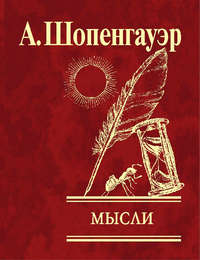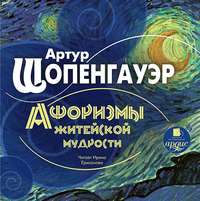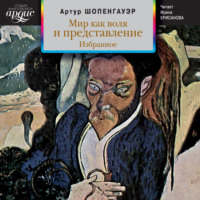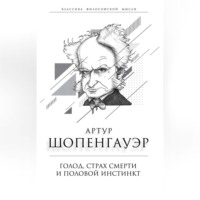 полная версия
полная версияThe World as Will and Idea (Vol. 2 of 3)
I shall further take the opportunity of denouncing here the disorder which for some years has been introduced into German orthography in an unprecedented manner. Scribblers of every species have heard something of conciseness of expression, but do not know that this consists in the careful omission of everything superfluous (to which, it is true, the whole of their writings belong), but imagine they can arrive at it by clipping the words as swindlers clip coin; and every syllable which appears to them superfluous, because they do not feel its value, they cut off without more ado. For example, our ancestors, with true tact, said “Beweis” and “Verweis;” but, on the other hand, “Nachweisung.” The fine distinction analogous to that between “Versuch” and “Versuchung,” “Betracht” and “Betrachtung,” is not perceptible to dull ears and thick skulls; therefore they have invented the word “Nachweis,” which has come at once into general use, for this only requires that an idea should be thoroughly awkward and a blunder very gross. Accordingly a similar amputation has already been proposed in innumerable words; for example, instead of “Untersuchung” is written “Untersuch;” nay, even instead of “allmälig,” “mälig;” instead of “beinahe,” “nahe;” instead of “beständig,” “ständig.” If a Frenchman took upon himself to write “près” instead of “presque,” or if an Englishman wrote “most” instead of “almost,” they would be laughed at by every one as fools; but in Germany whoever does this sort of thing passes for a man of originality. Chemists already write “löslich” and “unlöslich” instead of “unauflöslich,” and if the grammarians do not rap them over the knuckles they will rob the language of a valuable word. Knots, shoe-strings, and also conglomerates of which the cement is softened, and all analogous things are “löslich” (can be loosed); but what is “auflöslich” (soluble), on the other hand, is whatever vanishes in a liquid, like salt in water. “Auflösen” (to dissolve) is the terminus ad hoc, which says this and nothing else, marking out a definite conception; but our acute improvers of the language wish to empty it into the general rinsing-pan “lösen” (to loosen); they would therefore in consistency be obliged to make “lösen” also take the place everywhere of “ablösen” (to relieve, used of guards), “auslösen” (to release), “einlösen” (to redeem), &c., and in these, as in the former case, deprive the language of definiteness of expression. But to make the language poorer by a word means to make the thought of the nation poorer by a conception. Yet this is the tendency of the united efforts of almost all our writers of books for the last ten or twenty years. For what I have shown here by one example can be supported by a hundred others, and the meanest stinting of syllables prevails like a disease. The miserable wretches actually count the letters, and do not hesitate to mutilate a word, or to use one in a false sense, whenever by doing so they can gain two letters. He who is capable of no new thoughts will at least bring new words to market, and every ink-slinger regards it as his vocation to improve the language. Journalists practise this most shamelessly; and since their papers, on account of the trivial nature of their contents, have the largest public, indeed a public which for the most part reads nothing else, a great danger threatens the language through them. I therefore seriously advise that they should be subjected to an orthographical censorship, or that they should be made to pay a fine for every unusual or mutilated word; for what could be more improper than that changes of language should proceed from the lowest branch of literature? Language, especially a relatively speaking original language like German, is the most valuable inheritance of a nation, and it is also an exceedingly complicated work of art, easily injured, and which cannot again be restored, therefore a noli me tangere. Other nations have felt this, and have shown great piety towards their languages, although far less complete than German. Therefore the language of Dante and Petrarch differs only in trifles from that of to-day; Montaigne is still quite readable, and so also is Shakspeare in his oldest editions. For a German indeed it is good to have somewhat long words in his mouth; for he thinks slowly, and they give him time to reflect. But this prevailing economy of language shows itself in yet more characteristic phenomena. For example, in opposition to all logic and grammar, they use the imperfect for the perfect and pluperfect; they often stick the auxiliary verb in their pocket; they use the ablative instead of the genitive; for the sake of omitting a couple of logical particles they make such intricate sentences that one has to read them four times over in order to get at the sense; for it is only the paper and not the reader's time that they care to spare. In proper names, after the manner of Hottentots, they do not indicate the case either by inflection or article: the reader may guess it. But they are specially fond of contracting the double vowel and dropping the lengthening h, those letters sacred to prosody; which is just the same thing as if we wanted to banish η and ω from Greek, and make ε and ο take their place. Whoever writes Scham, Märchen, Mass, Spass, ought also to write Lon, Son, Stat, Sat, Jar, Al, &c. But since writing is the copy of speech, posterity will imagine that one ought to speak as one writes; and then of the German language there will only remain a narrow, mouth-distorting, jarring noise of consonants, and all prosody will be lost. The spelling “Literatur” instead of the correct “Litteratur” is also very much liked, because it saves a letter. In defence of this the participle of the verb linere is given as the root of the word. But linere means to smear; therefore the favoured spelling might actually be correct for the greater part of German bookmaking; so that one could distinguish a very small “Litteratur” from a very extensive “Literatur.” In order to write concisely let a man improve his style and shun all useless gossip and chatter, and then he will not need to cut out syllables and letters on account of the dearness of paper. But to write so many useless pages, useless sheets, useless books, and then to want to make up this waste of time and paper at the cost of the innocent syllables and letters – that is truly the superlative of what is called in English being penny wise and pound foolish. It is to be regretted that there is no German Academy to take charge of the language against literary sans-culottism, especially in an age when even those who are ignorant of the ancient language venture to employ the press. I have expressed my mind more fully on the whole subject of the inexcusable mischief being done at the present day to the German language in my “Parerga,” vol. ii. chap. 23.
In my essay on the principle of sufficient reason, § 51, I already proposed a first classification of the sciences in accordance with the form of the principle of sufficient reason which reigns in them; and I also touched upon it again in §§ 7 and 15 of the first volume of this work. I will give here a small attempt at such a classification, which will yet no doubt be susceptible of much improvement and perfecting: —
I. Pure a priori Sciences.
1. The doctrine of the ground of being.
(a.) In space: Geometry.
(b.) In time: Arithmetic and Algebra.
2. The doctrine of the ground of knowing: Logic.
II. Empirical or a posteriori Sciences. All based upon the ground of becoming, i. e., the law of causality, and upon the three modes of that law.
1. The doctrine of causes.
(a.) Universal: Mechanics, Hydrodynamics, Physics, Chemistry.
(b.) Particular: Astronomy, Mineralogy, Geology, Technology, Pharmacy.
2. The doctrine of stimuli.
(a.) Universal: Physiology of plants and animals, together with the ancillary science, Anatomy.
(b.) Particular: Botany, Zoology, Zootomy, Comparative Physiology, Pathology, Therapeutics.
3. The doctrine of motives.
(a.) Universal: Ethics, Psychology.
(b.) Particular: Jurisprudence, History.
Philosophy or Metaphysics, as the doctrine of consciousness and its contents in general, or of the whole of experience as such, does not appear in the list, because it does not at once pursue the investigation which the principle of sufficient reason prescribes, but first has this principle itself as its object. It is to be regarded as the thorough bass of all sciences, but belongs to a higher class than they do, and is almost as much related to art as to science. As in music every particular period must correspond to the tonality to which thorough bass has advanced, so every author, in proportion to the line he follows, must bear the stamp of the philosophy which prevails in his time. But besides this, every science has also its special philosophy; and therefore we speak of the philosophy of botany, of zoology, of history, &c. By this we must reasonably understand nothing more than the chief results of each science itself, regarded and comprehended from the highest, that is the most general, point of view which is possible within that science. These general results connect themselves directly with general philosophy, for they supply it with important data, and relieve it from the labour of seeking these itself in the philosophically raw material of the special sciences. These special philosophies therefore stand as a mediating link between their special sciences and philosophy proper. For since the latter has to give the most general explanations concerning the whole of things, these must also be capable of being brought down and applied to the individual of every species of thing. The philosophy of each science, however, arises independently of philosophy in general, from the data of its own science itself. Therefore it does not need to wait till that philosophy at last be found; but if worked out in advance it will certainly agree with the true universal philosophy. This, on the other hand, must be capable of receiving confirmation and illustration from the philosophies of the particular sciences; for the most general truth must be capable of being proved through the more special truths. Goethe has afforded a beautiful example of the philosophy of zoology in his reflections on Dalton's and Pander's skeletons of rodents (Hefte zur Morphologie, 1824). And like merit in connection with the same science belongs to Kielmayer, Delamark, Geoffroy St. Hilaire, Cuvier, and many others, in that they have all brought out clearly the complete analogy, the inner relationship, the permanent type, and systematic connection of animal forms. Empirical sciences pursued purely for their own sake and without philosophical tendency are like a face without eyes. They are, however, a suitable occupation for men of good capacity who yet lack the highest faculties, which would even be a hindrance to minute investigations of such a kind. Such men concentrate their whole power and their whole knowledge upon one limited field, in which, therefore, on condition of remaining in entire ignorance of everything else, they can attain to the most complete knowledge possible; while the philosopher must survey all fields of knowledge, and indeed to a certain extent be at home in them; and thus that complete knowledge which can only be attained by the study of detail is necessarily denied him. Therefore the former may be compared to those Geneva workmen of whom one makes only wheels, another only springs, and a third only chains. The philosopher, on the other hand, is like the watchmaker, who alone produces a whole out of all these which has motion and significance. They may also be compared to the musicians of an orchestra, each of whom is master of his own instrument; and the philosopher, on the other hand, to the conductor, who must know the nature and use of every instrument, yet without being able to play them all, or even one of them, with great perfection. Scotus Erigena includes all sciences under the name Scientia, in opposition to philosophy, which he calls Sapientia. The same distinction was already made by the Pythagoreans; as may be seen from Stobæus (Floril., vol. i. p. 20), where it is very clearly and neatly explained. But a much happier and more piquant comparison of the relation of the two kinds of mental effort to each other has been so often repeated by the ancients that we no longer know to whom it belongs. Diogenes Laertius (ii. 79) attributes it to Aristippus, Stobæus (Floril., tit. iv. 110) to Aristo of Chios; the Scholiast of Aristotle ascribes it to him (p. 8 of the Berlin edition), but Plutarch (De Puer. Educ., c. 10) attributes it to Bio – “Qui ajebat, sicut Penelopes proci, quum non possent cum Penelope concumbere, rem cum ejus ancillis habuissent; ita qui philosophiam nequeunt apprehendere eos in alliis nullius pretii disciplinis sese conterere.” In our predominantly empirical and historical age it can do no harm to recall this.
Chapter XIII.25 On The Methods Of Mathematics
Euclid's method of demonstration has brought forth from its own womb its most striking parody and caricature in the famous controversy on the theory of parallels, and the attempts, which are repeated every year, to prove the eleventh axiom. This axiom asserts, and indeed supports its assertion by the indirect evidence of a third intersecting line, that two lines inclining towards each other (for that is just the meaning of “less than two right angles”) if produced far enough must meet – a truth which is supposed to be too complicated to pass as self-evident, and therefore requires a demonstration. Such a demonstration, however, cannot be produced, just because there is nothing that is not immediate. This scruple of conscience reminds me of Schiller's question of law: —
“For years I have used my nose for smelling. Have I, then, actually a right to it that can be proved?” Indeed it seems to me that the logical method is hereby reduced to absurdity. Yet it is just through the controversies about this, together with the vain attempts to prove what is directly certain as merely indirectly certain, that the self-sufficingness and clearness of intuitive evidence appears in contrast with the uselessness and difficulty of logical proof – a contrast which is no less instructive than amusing. The direct certainty is not allowed to be valid here, because it is no mere logical certainty following from the conceptions, thus resting only upon the relation of the predicate to the subject, according to the principle of contradiction. That axiom, however, is a synthetical proposition a priori, and as such has the guarantee of pure, not empirical, perception, which is just as immediate and certain as the principle of contradiction itself, from which all demonstrations first derive their certainty. Ultimately this holds good of every geometrical theorem, and it is quite arbitrary where we draw the line between what is directly certain and what has first to be demonstrated. It surprises me that the eighth axiom is not rather attacked. “Figures which coincide with each other are equal to each other.” For “coinciding with each other” is either a mere tautology or something purely empirical which does not belong to pure perception but to external sensuous experience. It presupposes that the figures may be moved; but only matter is movable in space. Therefore this appeal to coincidence leaves pure space – the one element of geometry – in order to pass over to what is material and empirical.
The reputed motto of the Platonic lecture-room, “Αγεωμετρητος μηδεις εισιτω,” of which mathematicians are so proud, was no doubt inspired by the fact that Plato regarded the geometrical figures as intermediate existences between the eternal Ideas and particular things, as Aristotle frequently mentions in his “Metaphysics” (especially i. c. 6, p. 887, 998, et Scholia, p. 827, ed. Berol.) Moreover, the opposition between those self-existent eternal forms, or Ideas, and the transitory individual things, was most easily made comprehensible in geometrical figures, and thereby laid the foundation of the doctrine of Ideas, which is the central point of the philosophy of Plato, and indeed his only serious and decided theoretical dogma. In expounding it, therefore, he started from geometry. In the same sense we are told that he regarded geometry as a preliminary exercise through which the mind of the pupil accustomed itself to deal with incorporeal objects, having hitherto in practical life had only to do with corporeal things (Schol. in Aristot., p. 12, 15). This, then, is the sense in which Plato recommended geometry to the philosopher; and therefore one is not justified in extending it further. I rather recommend, as an investigation of the influence of mathematics upon our mental powers, and their value for scientific culture in general, a very thorough and learned discussion, in the form of a review of a book by Whewell in the Edinburgh Review of January 1836. Its author, who afterwards published it with some other discussions, with his name, is Sir W. Hamilton, Professor of Logic and Metaphysics in Scotland. This work has also found a German translator, and has appeared by itself under the title, “Ueber den Werth und Unwerth der Mathematik” aus dem Englishen, 1836. The conclusion the author arrives at is that the value of mathematics is only indirect, and lies in the application to ends which are only attainable through them; but in themselves mathematics leave the mind where they find it, and are by no means conducive to its general culture and development, nay, even a decided hindrance. This conclusion is not only proved by thorough dianoiological investigation of the mathematical activity of the mind, but is also confirmed by a very learned accumulation of examples and authorities. The only direct use which is left to mathematics is that it can accustom restless and unsteady minds to fix their attention. Even Descartes, who was yet himself famous as a mathematician, held the same opinion with regard to mathematics. In the “Vie de Descartes par Baillet,” 1693, it is said, Liv. ii. c. 6, p. 54: “Sa propre expérience l'avait convaincu du peu d'utilité des mathématiques, surtout lorsqu'on ne les cultive que pour elles mêmes… Il ne voyait rien de moins solide, que de s'occuper de nombres tout simples et de figures imaginaires,” &c.
Chapter XIV. On The Association Of Ideas
The presence of ideas and thoughts in our consciousness is as strictly subordinated to the principle of sufficient reason in its different forms as the movement of bodies to the law of causality. It is just as little possible that a thought can appear in the mind without an occasion as that a body can be set in motion without a cause. Now this occasion is either external, thus an impression of the senses, or internal, thus itself also a thought which introduces another thought by means of association. This again depends either upon a relation of reason and consequent between the two; or upon similarity, even mere analogy; or lastly upon the circumstance that they were both first apprehended at the same time, which again may have its ground in the proximity in space of their objects. The last two cases are denoted by the word à propos. The predominance of one of these three bonds of association of thoughts over the others is characteristic of the intellectual worth of the man. The first named will predominate in thoughtful and profound minds, the second in witty, ingenious, and poetical minds, and the third in minds of limited capacity. Not less characteristic is the degree of facility with which one thought recalls others that stand in any kind of relation to it: this constitutes the activeness of the mind. But the impossibility of the appearance of a thought without its sufficient occasion, even when there is the strongest desire to call it up, is proved by all the cases in which we weary ourselves in vain to recollect something, and go through the whole store of our thoughts in order to find any one that may be associated with the one we seek; if we find the former, the latter is also found. Whoever wishes to call up something in his memory first seeks for a thread with which it is connected by the association of thoughts. Upon this depends mnemonics: it aims at providing us with easily found occasioners or causes for all the conceptions, thoughts, or words which are to be preserved. But the worst of it is that these occasioners themselves have first to be recalled, and this again requires an occasioner. How much the occasion accomplishes in memory may be shown in this way. If we have read in a book of anecdotes say fifty anecdotes, and then have laid it aside, immediately afterwards we will sometimes be unable to recollect a single one of them. But if the occasion comes, or if a thought occurs to us which has any analogy with one of those anecdotes, it immediately comes back to us; and so with the whole fifty as opportunity offers. The same thing holds good of all that we read. Our immediate remembrance of words, that is, our remembrance of them without the assistance of mnemonic contrivances, and with it our whole faculty of speech, ultimately depends upon the direct association of thoughts. For the learning of language consists in this, that once for all we so connect a conception with a word that this word will always occur to us along with this conception, and this conception will always occur to us along with this word. We have afterwards to repeat the same process in learning every new language; yet if we learn a language for passive and not for active use – that is, to read, but not to speak, as, for example, most of us learn Greek – then the connection is one-sided, for the conception occurs to us along with the word, but the word does not always occur to us along with the conception. The same procedure as in language becomes apparent in the particular case, in the learning of every new proper name. But sometimes we do not trust ourselves to connect directly the name of this person, or town, river, mountain, plant, animal, &c., with the thought of each so firmly that it will call each of them up of itself; and then we assist ourselves mnemonically, and connect the image of the person or thing with any perceptible quality the name of which occurs in that of the person or thing. Yet this is only a temporary prop to lean on; later we let it drop, for the association of thoughts becomes an immediate support.
The search of memory for a clue shows itself in a peculiar manner in the case of a dream which we have forgotten on awaking, for in this case we seek in vain for that which a few minutes before occupied our minds with the strength of the clearest present, but now has entirely disappeared. We grasp at any lingering impression by which may hang the clue that by virtue of association would call that dream back again into our consciousness. According to Kieser, “Tellurismus,” Bd. ii. § 271, memory even of what passed in magnetic-somnambular sleep may possibly sometimes be aroused by a sensible sign found when awake. It depends upon the same impossibility of the appearance of a thought without its occasion that if we propose to do anything at a definite time, this can only take place if we either think of nothing else till then, or if at the determined time we are reminded of it by something, which may either be an external impression arranged beforehand or a thought which is itself again brought about in the regular way. Both, then, belong to the class of motives. Every morning when we awake our consciousness is a tabula rasa, which, however, quickly fills itself again. First it is the surroundings of the previous evening which now reappear, and remind us of what we thought in these surroundings; to this the events of the previous day link themselves on; and so one thought rapidly recalls the others, till all that occupied us yesterday is there again. Upon the fact that this takes place properly depends the health of the mind, as opposed to madness, which, as is shown in the third book, consists in the existence of great blanks in the memory of past events. But how completely sleep breaks the thread of memory, so that each morning it has to be taken up again, we see in particular cases of the incompleteness of this operation. For example, sometimes we cannot recall in the morning a melody which the night before ran in our head till we were tired of it.









